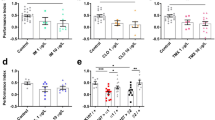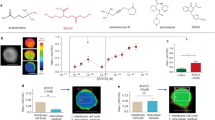Abstract
The formamidines are a structurally novel group of pesticides of growing importance in the control of mites, cattle ticks and certain orders of insects which have become resistant to conventional acaricides and insecticides. Their mode of action is complex with dose-dependent lethal and sublethal effects1–3. At sublethal levels they cause behavioural changes in the target pest species (for example in feeding and in mating behaviours), changes which are responsible for the protective effects on crops and livestock. Although many suggestions have been made for the underlying biochemical mechanism, including inhibition of monoamine oxidase activity, uncoupling of respiration and blockade of neuromuscular transmission1, no direct evidence has been presented. Another possibility is interaction with octopamine receptors in the central nervous system2,4,5. We report here that the formamidine acaricide/insecticide, chlordimeform (CDM), and its demethylated derivative can mimic the actions of octopamine at the locust neuromuscular junction. This gives the clearest evidence to date of the site of action of the formamidines and indicates a novel mode of action for these pesticides.
This is a preview of subscription content, access via your institution
Access options
Subscribe to this journal
Receive 51 print issues and online access
$199.00 per year
only $3.90 per issue
Buy this article
- Purchase on Springer Link
- Instant access to full article PDF
Prices may be subject to local taxes which are calculated during checkout
Similar content being viewed by others
References
Beeman, R. W. & Matsumura, F. in Pesticide and Venom Neurotoxicity (eds Shankland, D. L., Hollingworth, R. M. & Smyth, T. Jr) 179–188 (Plenum, New York, 1978).
Lund, A. E., Hollingworth, R. M. & Murdock, L. L. in Advances in Pesticide Science, Part 3 (ed. Geissbuehler, H.). 465–469 (Pergamon, Oxford, 1979).
Lund, A. E., Hollingworth, R. M. & Shankland, D. L. Pest. Biochem. Physiol. 11, 117–128, (1979).
Murdock, L. L. & Hollingworth, R. M. in Insect Neurobiology and Pesticide Action, 415–422 (Soc. Chem. Ind., London, 1980).
Hollingworth, R. M. & Murdock, L. L. Science 208, 74–76 (1980).
Carlson, A. D. J. exp. Biol. 49, 195–199 (1968).
Nathanson, J. A. Science 203, 65–68 (1979).
Evans, P. D. & O'Shea, M. Nature 270, 275–279 (1977).
Evans, P. D. & O'Shea, M. J. exp. Biol. 73, 235–260 (1978).
O'Shea, M. & Evans, P. D. J. exp. Biol. 79, 169–190 (1979).
Evans, P. D. in Receptors for Neurotransmitters, Hormones and Pheromones in Insects (eds Sattelle, D. B., Hall, L. M. & Hildebrand, J. G.) 147–158 (Elsevier, Amsterdam, 1980).
Buchan, P. B. & Evans, P. D. J. exp. Biol. 85, 349–352 (1980).
Knowles, C. O. & Schuntner, C. A. J. Aust. ent. Soc. 13, 11–16 (1974).
Hoyle, G. J. exp. Zool. 193, 425–431 (1975).
Author information
Authors and Affiliations
Rights and permissions
About this article
Cite this article
Evans, P., Gee, J. Action of formamidine pesticides on octopamine receptors. Nature 287, 60–62 (1980). https://doi.org/10.1038/287060a0
Received:
Accepted:
Issue Date:
DOI: https://doi.org/10.1038/287060a0
This article is cited by
-
Hearing of malaria mosquitoes is modulated by a beta-adrenergic-like octopamine receptor which serves as insecticide target
Nature Communications (2023)
-
Effect of Tagetes minuta essential oil on the central nervous system of unfed Rhipicephalus sanguineus sensu lato ‘tropical lineage’ ticks
Experimental and Applied Acarology (2023)
-
In silico identification and assessment of insecticide target sites in the genome of the small hive beetle, Aethina tumida
BMC Genomics (2020)
-
Neuromodulation of insect motion vision
Journal of Comparative Physiology A (2020)
-
Gene expression, sperm viability, and queen (Apis mellifera) loss following pesticide exposure under laboratory and field conditions
Apidologie (2019)
Comments
By submitting a comment you agree to abide by our Terms and Community Guidelines. If you find something abusive or that does not comply with our terms or guidelines please flag it as inappropriate.



